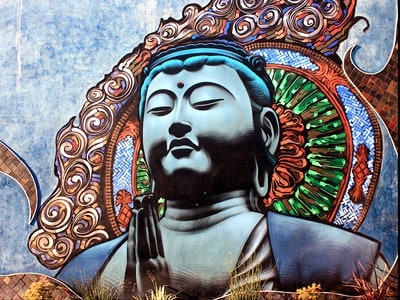Valentine’s Day at Oregon State Prison
Sharing the Dharma with incarcerated people

This past Valentine’s Day, Venerable Thubten Chodron and I drove to Salem, Oregon, walked past a huge gaggle of grey geese on the prison lawn and entered the Oregon State Penitentiary (OSP) for men. OSP houses those convicted of felonies. In the small visiting room, we met Randi from the Dharma Rain Zen Center in Portland. Randi and three Dharma friends of hers have been teaching Buddhism at OSP for a number of years. Venerable had a box of Valentine’s chocolates tucked under her arm, a gift to her from another Dharma group. She was hoping to bring the men a treat. However, we were not allowed to take them inside and left them in the visiting room for the staff and families who come to connect with their brothers, husbands, fathers, sons.
The Catholic chaplain, a Jesuit priest, escorted us to the chapel. There, we met the 12 men who had come to hear Venerable’s teachings. What I remember most clearly is the openness, warmth and strength of Venerable’s manner and the curiosity and wide-ranging discussion by the incarcerated people. Several of the men had been coming to the group for a while—others were brand new to Buddhism. One of them revealed he will be at OSP for the rest of his life.
One young man, who I can only describe as arriving inside a grey cloud of isolation, told us that he had been in OSP already for nine years. He appeared to be about 28 years old. He said he had learned to let nothing touch him. He wondered about this survival stance and the Buddhist idea of non-attachment. Were they similar? Venerable talked with him about perceptions: how we can mistake a rope for a snake and act on that wrong view. She pointed out that non-attachment is not based on not caring. Leaning into the group, he began to share how difficult it has been for him to keep a clear mind in the prison after so long.
All the men reflected the tremendous struggle they have “keeping it together” in a dark, depressing, often violent atmosphere. Venerable, talking about compassion, related the story of a Tibetan monk who had been imprisoned and tortured by the Chinese. After he had escaped, the Dalai Lama asked him what had most frightened him during that difficult time. He replied that he was afraid of losing his compassion for the guards who tortured him. Several of the men had that “light bulb over the head—aha look”. They showed a lot of respect and kindness toward all of us and maybe more importantly, toward one another.
As we left, an incarcerated person sweeping the floor in the visiting room held up a half-eaten chocolate from the heart-shaped box we had left there earlier. “Thank you,” he said, and smiled broadly at us before going back to his work. This trip with Venerable gave me the opportunity to see the great intelligence and potential of these men in prison. It left me with gratitude for my freedoms and thinking about prisons, OSP and samsara and hoping for total liberation for all of us.
Zopa Herron
Karma Zopa began to focus on the Dharma in 1993 through Kagyu Changchub Chuling in Portland, Oregon. She was a mediator and adjunct professor teaching Conflict Resolution. From 1994 onward, she attended at least 2 Buddhist retreats per year. Reading widely in the Dharma, she met Venerable Thubten Chodron in 1994 at Cloud Mountain Retreat Center and has followed her ever since. In 1999, Zopa took Refuge and the 5 precepts from Geshe Kalsang Damdul and from Lama Michael Conklin, receiving the precept name, Karma Zopa Hlamo. In 2000, she took Refuge precepts with Ven Chodron and received the Bodhisattva vows the next year. For several years, as Sravasti Abbey was established, she served as co-chair of Friends of Sravasti Abbey. Zopa has been fortunate to hear teachings from His Holiness the Dalai Lama, Geshe Lhundup Sopa, Lama Zopa Rinpoche, Geshe Jampa Tegchok, Khensur Wangdak, Venerable Thubten Chodron, Yangsi Rinpoche, Geshe Kalsang Damdul, Dagmo Kusho and others. From 1975-2008, she engaged in social services in Portland in a number of roles: as a lawyer for people with low incomes, an instructor in law and conflict resolution, a family mediator, a cross-cultural consultant with Tools for Diversity and a coach for executive directors of non-profits. In 2008, Zopa moved to Sravasti Abbey for a six-month trial living period and she has remained ever since, to serve the Dharma. Shortly thereafter, she began using her refuge name, Karma Zopa. In May 24, 2009, Zopa took the 8 anagarika precepts for life, as a lay person offering service in the Abbey office, kitchen, gardens and buildings. In March 2013, Zopa joined KCC at Ser Cho Osel Ling for a one year retreat. She is now in Portland, exploring how to best support the Dharma, with plans to return to Sravasti for a time.


